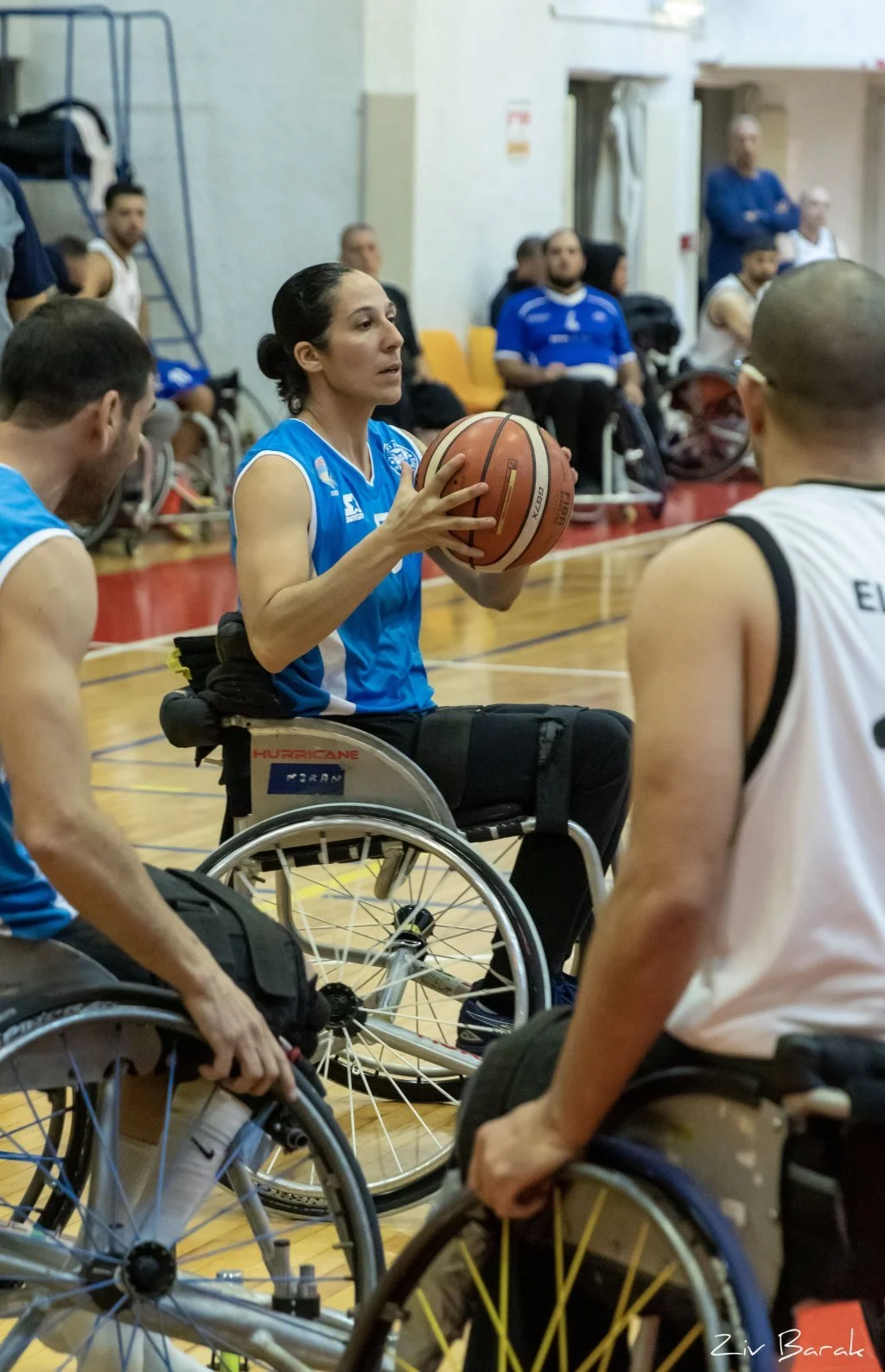Paralympic Rowing Medallist and Mother of Three – Moran Samuel on Uniting Two Lives
Three-time Paralympian. Two-time Paralympic medallist. 2015 world champion. Mother of three. Moran Samuel has a lot to look back on. The Israeli para rower has worked hard and made many of her wildest dreams come true over the past years. We talked to the 40-year-old powerhouse about her love for basketball, tragedy, never giving up, motherhood and goals for Munich 2022.
Around 2010 Samuel realised she wanted to be a Paralympian. But she knew that the Israeli wheelchair basketball team she was on was nowhere near qualifying, not for many years to come. Therefore, she met up with the Paralympic sports director to talk about her options. “After considering my abilities and my disability and the sports that are available, she thought that rowing is the sport for me.” The sports director herself was a former rower, and Samuel agreed with her conclusion for good reason. “I wanted to go to the Paralympic Games, but I had another interest. And that sports director became my wife a year later. And two years later I represented Israel in London in rowing.” One has to admit that Samuel’s goal setting and negotiation skills are impeccable.
© Roco Runs
Her wife, Limor Samuel Goldberg, has supported many female Paralympians and helped even more find their sport in the past 15 years. Samuel never thought rowing would become part of her life as she never tried it as an able-bodied person, but it has. To some rowing, just like running or swimming, is boring, “but for me it was the first time I was able to do sport outside of my wheelchair. And that was amazing – the freedom of that.”
Growing up in an able body Samuel ran and played basketball and literally can’t remember a time when she wasn’t on the court. In the beginning she had to play with the boys as there was no girls team in her small hometown of Karmi’el. From the start she’s always known how to find a place for herself, even when there wasn’t any.
© Ziv Barak
FROM BASKETBALL TO PARA ROWING
Nevertheless, she couldn’t have pictured the mental toll recovery takes. “I actually tried to avoid basketball as much as I could, because it was just heart-breaking. Through high school you wouldn’t find an anatomical heart in my chest. Mine was round, orange and bouncing up and down.” Within just two hours that ball had deflated to now lay still. And so, three years went by without her doing sport. But then Samuel got a call, informing her that the national wheelchair basketball team was being rebuilt and asking her if she was interested in joining said team.
At just 15 she joined the women’s youth national basketball team, representing Israel. Later she completed her mandatory military service at the Israeli Air Force in a special section for elite athletes, before starting her bachelor’s degree in physical therapy. But her life didn’t go according to plan. In 2006 the elite athlete suffered a rare condition that would change her life forever. A sudden spinal stroke left her paralysed from chest down. “You cannot be prepared for things like that. It doesn’t matter how it happens. It’s really devastating. In two hours I was actually completely paralysed in 70 per cent of my body.” She underwent special surgery followed by a gruelling rehabilitation.
On that journey she wondered who she was if not the able-bodied, tall, professional basketball player. But she found a different focus: “If I wanted to be a physiotherapist before then realising what it takes and what rehabilitation is all about made me even believe ‘I have to do it’.”
On her birthday in 2009, she drove two hours to get to her first practice since the injury. “In my memory, it’s all in slow motion with romantic music in the background and kind of a Hollywood-esque scene,” she tells me with a hearty laugh. And you cannot help but believe her. No wonder she’s a motivational speaker, she could move mountains with her words alone.
Her journey from there is the sum of small steps. “Those small victories of not giving up, going back to school and going back to sport” added up. Soon Samuel had the goal to represent Israel at the Paralympics and started rowing in 2010. Nevertheless, she went on to play the European championships in wheelchair basketball in 2011 and 2013.
© Roco Runs
PARA SPORT
There are three important points Samuel wanted to get across in our exclusive interview: 1) Everyone trains hard. 2) “Statistically, yes there are less athletes, but in order to get to the highest level you have to work really, really hard. It’s completely professional.” And 3) Para athletes “have the mission to make the world a better place for people with disabilities in general.” As there ought to be more possibilities to engage in sport activities, and better access to education and work and other aspects of life overall. Also, para sport needs its classifications just like in judo or weightlifting because sport needs to be just. And “it’s impossible to compare someone who uses legs to someone who cannot use their legs.”
“I want people to know that Paralympians aren’t better than Olympians or the other way around. I just appreciate athletes.” Samuel herself is an athlete to appreciate. In 2015 she became world champion and was voted “Para Athlete of the Year” by World Rowing.
Many assume all rowers mostly use their arms, but that’s a myth! Ireland’s Olympic gold medallist Fintan McCarthy said as much in our exclusive interview with him. The myth happens to apply to rowers in the PR1 category, however. And “moving your boat using mostly your upper body is tough.”
But that’s not the only added difficulty. “A single scull weighs 14 kilograms if you are an able body, and weighs 24 kilograms if you are para.” Because of the different composition of the boat, with it being wider and having pontoons on each side, para athletes need to move more weight with less muscle strands. “When I train with able body rowers, we do a short sprint where they can only use their arms and they are dead after 100 metres,” Samuel says with a grin.
MOTHERHOOD AND MEDALS
When planning her life, Samuel never thought her sport career and dreams of becoming a mother would mix well, let alone mesh into each other seamlessly and happen all at once. But “I’m lucky to be married to a woman, so we can alternate. And she gave birth in 2016 to our first child, and he was born seven months before the Paralympic Games in Rio. One of my most amazing moments in life was having my medal and then bringing him to the podium.” After winning her first Paralympic medal, a bronze, she was crowned “Female Athlete of the Year” by the Israeli Paralympic Committee.
She wanted to bear a child herself, too, but didn’t want to miss out on a world championship. So she competed two months pregnant at the 2017 World Rowing Championships – winning silver. “Actually, when I was pregnant it was much easier than doing it again four and a half months after giving birth.” Yes, you read that right! Samuel competed at the 2018 World Rowing Championships less than five months after giving birth.
© Lilach Wiess
Ten minutes before her warm-up for the final in 2018 her new-born daughter started crying at the top of her lungs and Samuel just knew her baby girl wouldn’t take the bottle; she’d prepared for her own mother to give her shortly. “So, I was breastfeeding behind this curtain in the rowing venue just 10 minutes before I’m leaving for my final. And then she fell asleep, and she was fine.” Samuel ended up being late for her warm-up and had to cut it short, but it was all worth it. At the start of her final all she could think of was “what an amazing life I have. And I’m able to do it, and just went full power to win another silver medal and went straight back to my family.”
“I just want women to know it’s possible. You don’t have to choose.” Samuel is leading by example and has shown it is possible to combine a (sport) career and motherhood. In 2021 Samuel was given the honour to be a flag bearer for the Paralympic Games in Tokyo, where she went on to win silver.
© Naomi Baker/ Staff/ Getty Images
NOT THE END - MUNICH 2022
The European Championships are the big return to the competition scene after deciding to go for another Paralympic Games in December 2021. “I’m very excited, because it’s the first time that I’m part of a bigger event besides the Paralympic Games. Usually, you only have the rowing events.”
“I’ve done three Paralympic Games and I have my medals in all different colours, I was a world champion already, so, what else?” The answer is obvious to Samuel: She wants her family to be by her side when she crosses the finish line for the last time.
Until then she has to try to beat the best in Munich. “Rowing in Europe is very, very strong. And many big teams arrive – able-body and para. Germany is known for good rowers – women and men. Most of my leading competitors are Europeans. So, they’re all going to be there.” Quite literally as five out of the six finalists in Tokyo were from Europe, and they made up the top 5.
“The best athlete in the world currently in my category for the last four years is Birgit Skarstein from Norway. She’s an amazing athlete.” The reigning European champion is one of the very few athletes to compete in summer and winter. Para skier in the snow, para rower in the water. So far, she has been to five Paralympic Games: Sochi, Rio, Pyeongchang, Tokyo, Beijing. Samuel will have to do her very best to keep up with the four-time world champion and world record holder.
Besides these two, Germany’s Sylvia Pille-Steppat and Anna Sheremet from Ukraine will fight for the medal ranks. Samuel sees a bright future for the young Ukrainian native. “I think she’s going to surprise in Munich. I see her on the podium in the next couple of years.” Until then we ought to focus on Samuel herself. The best way to do so is in person. So, what are you waiting for? Get your tickets for the Olympic Regatta Centre now.





